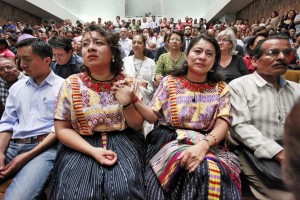
Two indigenous women sit at the trial of Efraín Ríos Montt shown in 500 Years, Yates third film; photo credits: Daniel Hernández-Salazar
This documentary is the second in an assumed trilogy by Pamela Yates that centers on the indictment of General Efraín Ríos Montt for his perpetuation of the Mayan genocide during the 80’s-armed conflict. Yates’ previous film, When the Mountains Tremble, released in 1983, centered on the Guatemalan armed conflict between the Guatemalan national army and the guerrilla, rebel forces. Many of those affected by the conflicted were the countless Mayan indigenous people and ladino peasants (non-indigenous, mestizos who were poor). This was very astounding given that 40% of Guatemala’s population consists of indigenous Mayan people. In the aftermath of this violence, there were brutal murders of nearly 200,000 Mayan people and many more disappeared.
This film in particular flashes back to her previous film, which she filmed at the center of the armed conflict in Guatemala because there was a lot of first-hand witnessing of the Guatemalan soldiers in action and interviews with many of them. Granito serves as a reflection on capturing the Mayan genocide that was taking place during the time of filming the initial film. As seen in the film, Yates’ original film seemed to be the only first-hand evidence that human rights lawyers could use to indict General Ríos Montt. The lawyers, specifically in Spain, wanted to indict him of knowing that the Mayan people were being killed in genocide under his rule and power, but they had no other evidence that could prove such claim. Throughout the film, you hear and see from Yates as she reflects on her film from 1983, recounting moments when she interviewed Ríos Montt to her, and other indigenous people, speaking to a judge so that his trial could take place.
This film reflects on the previous film of the armed conflict recounting trauma from the Mayan people and seeking accountability and justice on the part of Ríos Montt for the violence he enacted on indigenous people in Guatemala.
Review essay:
Stoll, David. “Genocide in Guatemala?” Academic Questions, vol. 31, no. 2, 17 Apr. 2018, pp. 219–226., doi:10.1007/s12129-018-9702-8.
(by Andrés Pérez Correa)
Gideon’s Army (2013) directed by Dawn Porter documents the personal and professional lives of three public defenders working for the criminal court systems in Georgia and Mississippi. Toggling back-and-forth between each of their lives and each their trials, the documentary captures the emotional hardship attendant upon those who unflinchingly and devotedly defense the otherwise defenseless. The documentary follows multiple trials defended each by Travis Williams, Brandy Alexander and June Hardwick. In addition to documenting the lives of clients as they prepare for trial – in home, in jail, or in offices – Gideon’s Army captures in intimate detail the struggle of these public defenders as they manage loans, relationships, children, and ultimately the burden of representing clients on trial for life-long prison sentences.
Indeed, much of the focus of the movie regards how these public defenders cope with burden of being a public defender. At one point, Alexander recounts a case in which her client was plotting to kill her if she did not obtain a not guilty verdict. In many ways, the documentary is about how these public defenders maintain despite strong reasons for quitting: low pay, long hours, stress, and dejection. The film attributes professional retention to the Southern Public Defender Training Center, an organization that now goes by the name of Gideon’s Promise, of which provides numerous services including support groups for public defenders to share their struggle and re-imagine their commitment. The name of the organization and the name of the documentary both reference the 1963 supreme court case Gideon v. Wainwright in which it was deemed that stares are required under the 14th amendment to provide council in criminal cases for defendants unable to pay for their own attorneys. The name of the film and the organization work not only to commemorate this case, but also to enjoin public defenders in a heroic community of individuals who defend those highly vulnerable in the justice system.
Throughout the documentary, the structural disincentives of working as a public defender and the painful failings of the justice system are clear. There is no doubt that the strength of public defenders stems from a sense of personal and communal commitment to the defense of the defenseless. In many ways, this documentary offers a form of recognition for those who work irregardless of public recognition.

